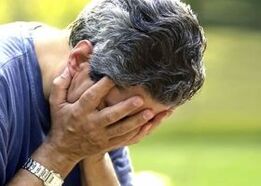
Men have fears just like women. Women are afraid of losing their beauty and attractiveness, and men are afraid of feeling a failure of masculinity. When a man is diagnosed with prostatitis, he immediately panics and fears of losing male power, and sometimes it would be useful for a man to consult a psychologist together with a urologist.
Prostatitis is an inflammatory disease of the prostate gland (prostate gland). This organ, similar in shape and size to a chestnut, is located directly under the bladder and produces seminal fluid, which is involved in the transfer of spermatozoa. But the whole problem is that the same organ (urethra) performs two functions at the same time, both as a urethra and as a conduit for seminal fluid. With inflammation of the prostate, both functions begin to suffer, which is the complexity of the development and treatment of prostatitis. For women, everything is simpler in this regard, because these functions are reserved for them.
Symptoms of prostatitis
The National Institutes of Health divides prostatitis into four categories:
- acute bacterial prostatitis
- chronic prostatitis
- bacterial prostatitis
- asymptomatic prostatitis
Symptoms and signs of prostatitis differ depending on the category.
Acute bacterial prostatitis is acute and manifests itself with the following symptoms:
- flu-like symptoms
- chills and fever
- pain in groin, lower back and prostate
- frequent urge to urinate
- pain during urination and blood in the urine
- painful ejaculation
With these symptoms, you should call an ambulance or see a doctor immediately.
Chronic bacterial prostatitis does not develop acutely like the first type of prostatitis. Symptoms develop more gradually, the course of the disease occurs in waves, that is, periods of calm are replaced by exacerbations.
Symptoms of chronic prostatitis:
- burning and pain when urinating
- frequent urge to urinate, especially at night
- pain in the pelvis, lower back and genitals
- recurrent cystitis
Chronic abacterial prostatitis is very similar in symptoms to bacterial prostatitis, but in most cases it lasts without fever and acute exacerbation. It is possible to distinguish bacterial prostatitis from bacterial prostatitis only with special laboratory tests.
Symptoms and signs of prostatitis are similar to those of many other diseases.
Causes of prostatitis
The main cause of prostatitis is bacteria in the large intestine. The infection begins to develop directly in the prostate, but sometimes it happens that it enters the prostate through the bladder or urethra. Chronic bacterial prostatitis may develop after acute prostatitis or may result from infections of other organs that may serve as a source of infection.
The causes of chronic abacterial prostatitis are not fully understood, currently several reasons and theories for the occurrence of this disease are put forward:
- lifting heavy objects can cause disease, if the weights are lifted when the bladder is full, as a result, urine is thrown into the prostate, thereby causing an inflammatory disease;
- pelvic muscle spasm or anatomical disorders of the genitourinary system can also cause inflammation;
- interstitial cystitis, although it is mainly a female disease, can also occur in men;
These are the main symptoms, signs and causes of prostatitis. Prostatitis is not a contact disease and is not sexually transmitted.
How to treat prostatitis
In this case, treatment can be prescribed by a doctor only after diagnosis. Do not listen to the advice of friends who offer to try their remedies. Medicines for prostatitis are prescribed individually. With prostatitis of the first and second category, antibiotics are used, physiotherapy, baths and massages are prescribed. Sometimes, although rarely, surgery may be necessary.
In order for prostatitis not to enter your life, you should lead a proper and healthy lifestyle, moreover, you should have a regular sex life (not forgetting protection and protective equipment). The intake of coffee, smoking and spicy foods should be minimized. In addition, it is necessary to drink plenty of water, not forgetting to empty the bladder regularly and on time. It is easier to prevent any disease than to cure it.





























